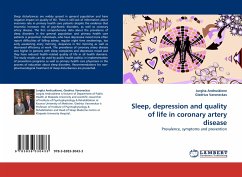Sleep disturbances are widely spread in general population and have negative impact on quality of life. There is still lack of information about insomnia rate in primary health care patients despite the evidence that insomnia increases risk of psychiatric disorders, as well as coronary artery disease. The first comprehensive data about the prevalence of sleep disorders in the general population and primary health care patients is presented. Individuals, who have depressive mood more often report difficulties of falling asleep, regular night time awakenings, too early awakening every morning, sleepiness in the morning as well as decreased efficiency at work. The prevalence of coronary artery disease was higher in persons with sleep complaints and depressive mood and they have reduced health related quality of life in all health domains. The study results can be used by public health politics in implementation of prevention programs as well as primary health care physicians in the process of education about sleep disorders. Recommendations for non-pharmacological treatment of sleep disturbances are presented.
Bitte wählen Sie Ihr Anliegen aus.
Rechnungen
Retourenschein anfordern
Bestellstatus
Storno








